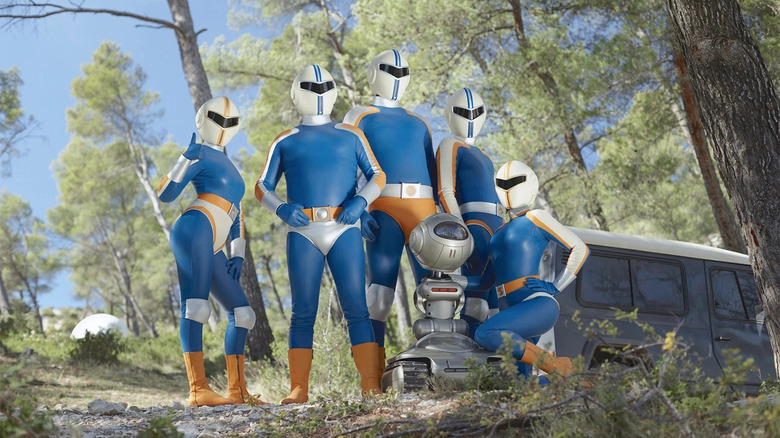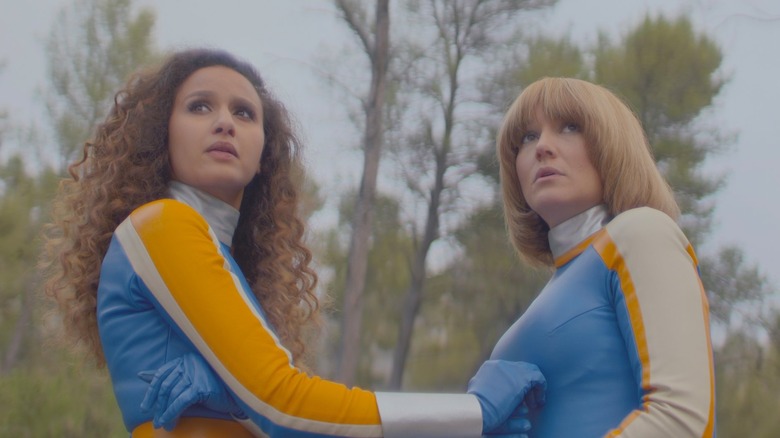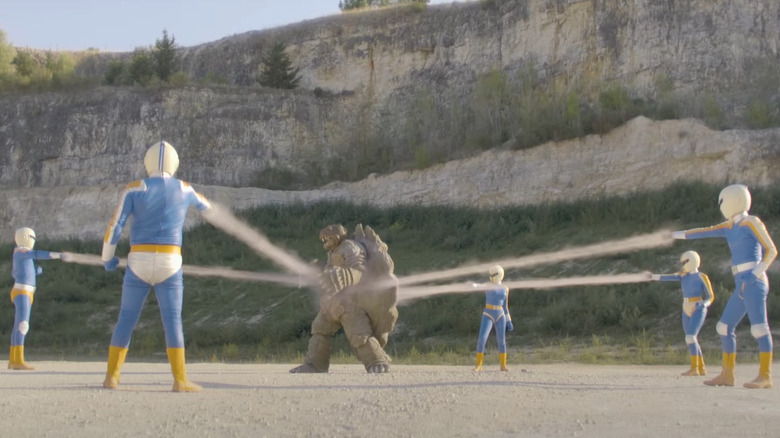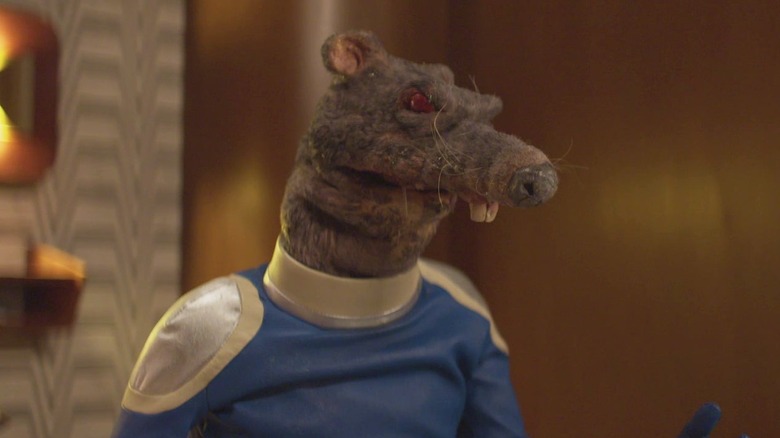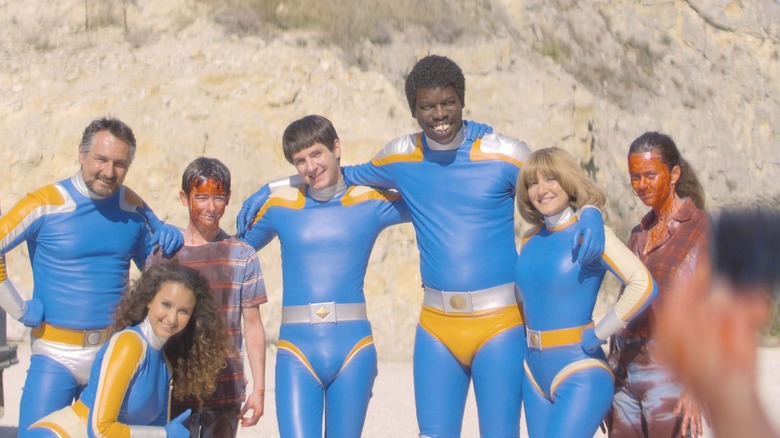Smoking Causes Coughing Director Breaks Down His Silly, Surreal Spin On The Superhero Film [Exclusive Interview]
If you know the name Quentin Dupieux, you likely know it from "Rubber," the slapstick thriller about a sentient, bloodthirsty car tire he directed in 2010. Now acclaimed in his home country of France for his unique brand of surrealism — at once wickedly humorous and nonchalant, even underplayed — Dupieux's filmmaking career took off in America with a string of riffs on schlock films. Before that, he was acclaimed (again) in France as Mr. Oizo, an electronic musician whose 1999 single "Flat Beat" spawned the beloved Levi's mascot "Flat Eric," built by Jim Henson's Creature Shop.
Dupieux has lived a storied life, and his latest film, "Smoking Causes Coughing," could only have been made by someone who understands the power of stories. The film follows a ragtag squadron of superheroes called The Tobacco Force who harness the powers of noxious fumes to destroy giant turtles and evil lizard men from space. More Power Rangers than Avengers, the members of the relatively gentle Tobacco Force are played by some of the leading stars of the French film scene, such as Anaïs Demoustier and Vincent Lacoste.
But "Smoking Causes Coughing" plays like a perfect antidote to superhero franchise fatigue. Rather than build the film around climaxes of righteous violence, Dupieux sends his supes to a lakeside relationship-building retreat, allowing the stories they tell each other beside the campfire to take over the film: A man alive despite being processed to the neck by a woodchipper; a "cone of contemplation" which turns a placid holiday into a horror movie; a tragic tale of ecological betrayal from the POV of a fish.
Dupieux has cooked up another weird and wild ride, and in the interview that follows, he gets into stories about storytelling, financing your most out-there ideas, and the Marvel and DC of it all.
Note: This interview has been lightly edited for clarity and brevity.
'I was obsessed by this idea of a tire slowly following a girl'
I'm curious, because you are the sole writer of almost all your films, what is your way in? What's the first thing that brings you into a new project? Is it a character, is it an image, a concept?
It depends, actually. It's never the same thing. To give you a very easy example, when I did "Rubber," the movie about the tire, I only had this visual in mind. I was obsessed by this idea of a tire slowly following a girl — a little bit like "Jaws," the shark movie, but with a tire. And that was the visual I had in mind, this tension of following a tire who is actually following someone. This was very exciting, and that's how I started writing the movie.
Then when I did the giant fly movie, "Mandibles," I wanted to work with these two French comedians [David Marsais and Grégoire Ludig] because they inspired me. So I started creating stupid characters for them. This led me to the fly concept. It's never the same, it depends on the movies, but usually there's a desire for a visual idea.
Was it the same for "Smoking Causes Coughing?" What was the thing that got you into the script?
I wanted to create, let's say, a new ... even if it's not new, because we've seen movies like this, like "Creepshow," for example. Do remember "Creepshow?" You're maybe too young.
Of course.
So, I know I didn't create this concept of a movie that tells different stories inside, but when I started writing this one, I was looking for a new structure, a movie with some surprises inside, like, "Oh, there's another story." And then you come back to reality, but then you go somewhere else. That was the main goal, to basically create a new format, even if I know it's not new. But it was new for me.
'Everything was a nightmare to me'
One thing that has been a huge subject of conversation lately is that these blockbuster superhero movies are not doing well. It seems like we might be at the end of this period of supercharged activity. So this film was really refreshing to me. You could have made a kind of cruel and snide movie, because everybody's so sick of superheroes. But you treat your characters with compassion, they're all so lovable, and they're also not buffoons. Creating that anchor story, were you thinking at all about the big superhero trend — Marvel, DC, all that — or was this something totally separate?
No, because actually I know nothing about these movies. I only see the posters. I know there's a lot of this stuff coming out, but I've never been into it. Maybe I watched the first "Spider-Man" by Sam Raimi, I don't know what, 15 years ago, because it was something new. I wanted to check how it was done. But I've never been into this stuff.
When I was still living in Los Angeles, I went to a movie theater with my son to watch an "Avengers" movie. I think it was the first "Avengers." I don't know. It was a nightmare for me. The sound, the noise, the explosions, the loud music, the editing, everything was a nightmare to me. So I think at this point I stopped. I was like, "No, this is not for me." And the movie we are talking about today is maybe ... it's like the reverse of this. It's slow. The pace is okay. There's no aggressive music. What can I say about superhero movies? Are you still watching these movies? It's impossible.
It is getting harder, because in some cases they're getting worse.
It's a torture. It's a torture. Plus the fact that it's almost like watching a video game now. The charm is missing. Who are these creatures? They're all made with CGI. Even for the kids, it's just like a stupid program. They don't get an emotional connection with these movies anymore because nothing's real. So they watch it, they enjoy, I guess, for a bit, but they have no emotional connection to these movies.
'I need these famous actors to basically finance my movies'
Part of that conversation has been people realizing that maybe what these huge companies are doing is trying to create characters that are box office draws and not actors, so they can increasingly get actors that they don't have to pay as much for. You do the opposite in "Smoking Causes Coughing." Not that people are going to go to the movie solely because of the stars, but it's funny that you first encounter all of the different characters with their helmets on, and then they take their helmets off, there are lots of big movie stars under those helmets. And I wonder, what was behind those casting choices?
I mean, let's put it this way: I need these famous actors to basically finance my movies. I'm working with them also because they're very talented, of course, and because they also want to work with me. A movie like "Deerskin," I don't know if you've seen this one, it was impossible to make without Jean Dujardin. I needed someone that big to be able to find a little bit of money to shoot the movie. Otherwise, nobody cares. They come for pleasure, they also come for the experience, because it's very different from what they're doing actually in some other movies.
I actually need them for their talent, but also because in a way, they validate the movie by being here. They say to the audience, "We think this director has something to say." You know what I mean? The same movie with only unknown actors suddenly will be hard to promote.
That period of time when you were living and working and making films in America, you didn't work with too many American stars. I mean, you probably worked with a lot of American actors, but you didn't anchor your films with American stars. Two that do jump out to me are Ray Wise and Grace Zabriskie, and I'm curious what it was like working with them.
There's no why, really. It was more like I wrote this movie and suddenly, exactly what I do on every movie I make, at some point you have to find actors for these small parts. I forgot how it happened, but I think we got Ray Wise ... in a meeting, someone just dropped this idea and I was like, "Oh yeah, he's a strong actor." And then someone else 10 days later brought the idea of, "Oh, we should get Grace Zabriskie too, it would be funny."
It's hard to explain — working with them was, of course, exciting and interesting for me. But at the same time, when I look back at this moment, I have to say we didn't share much. Now working in France again with some French actors, and I'm getting better and better, I know the work I do now with actors is more complex. Back in the day, for example, the stuff I did with Marilyn Manson ("Wrong Cops"), it was fun, but I was not really directing him, if you know what I mean. It's hard to explain. I was so excited and fresh in this business that working with all these people was ... it's very different from what I'm doing now when I work with actors. And if I go back to English-speaking movies, I will now work more.
'Everyone who reads the script has a different movie in mind'
Something that has always struck me about your work, and I definitely saw it in "Smoking Causes Coughing," your films are usually very funny, they can be very zany, they can be irreverent and they can be very light even when they're dealing with heavy subject matter. But there's always a little sliver of sadness. Where I saw it in this film was in the story that the little girl tells from the perspective of the fish. And it looks above the water and it sees the pollution being dumped into the lake. That was really sad.
Yeah, it's the worst. It's the worst.
It's so upsetting, and it's just sandwiched between those two longer stories. It makes such an impact because it's so distinct from them.
But you know what? Maybe it's because this one is true. This one is a real vision. And even if it's a little girl saying it, it is happening and it is real. So that's why it sounded so sad. The two other stories are crazy enough to make you think, "Whatever, it's a movie." But this suddenly, it's said by an innocent little girl, so then it's like, "Oh s***, yes." And the fact that the superheroes are shocked by the story makes it funny again.
You're often doing a real tonal balancing act in your films. There are so many different tones that you have to rein in and make sure that they're all cohesive. But in this film in particular, not only are you switching between different tones, but you're telling different stories with different characters that have different points of view. So for you, where does the real work come in, in terms of making sure everything feels cohesive? Is it in the writing? Do you feel like things come together in the edit?
Yeah, the editing is the most important part, and that's why I'm doing it myself. I usually say that this is the moment where you actually make the movie. Before that, the writing is amazing, because you start having a concept and ideas and it's very exciting, but it's a piece of paper. And basically, everyone who reads the script has a different movie in mind. I can tell. Some people want to see only the comedy, so they're going to say, "Oh, it's very funny. I had so much fun," and they're never going to talk about the other layers. And some other people are going to see only the sadness of it.
So when it comes to the edit, you are going to make a movie that everybody's going to receive the same way, in a way. And that's when basically I craft the tone, even if, of course, the shooting part is very important because that's where you find everything with the actors. But yes, I can tell today that yes, editing is where everything happens.
"Smoking Causes Coughing" arrives in theaters and on demand on March 31, 2023.
